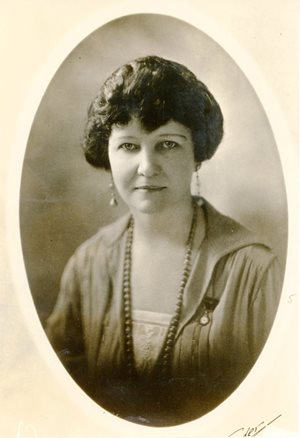American Legion Auxiliary historians play a vital role in our organization. Lillian Erwin Fleming, national historian 1926-1930, understood that and crafted the following article. Her insight of this important office, which appeared in the August 1928 edition of the American Legion Auxiliary Bulletin, is still true today. Our organization definitely has changed since Fleming’s writeup appeared in the national magazine (for one, male spouses can now join the ALA!), but as you read her words of wisdom, remember one important thought: Whatever is written in an organization’s history depends upon its members.
The Historian’s Responsibility (as written by Lillian Erwin Fleming in August 1928)
It is the year 2028. A young woman dressed – who can predict how she will be dressed – lands her airplane on the roof of the public library in an American city and goes into the building in search of a book to read. Scanning the shelves, her eyes are arrested by a book bearing the title:
A History of the Blankville Unit of the American Legion Auxiliary.

“The American Legion Auxiliary?” she will think. “Oh, yes, I remember an old lady who used to wear a blue and gold pin with that name on it. I was just a little girl then, and she has been dead for years.”
Interested, she will pick up the book and begin reading. What she will read will depend upon the work which unit historians are doing in this year 1928 and will continue to do throughout the life of the organization. Whether she will encounter pages of uninteresting statistics and verbatim reports which will cause her to put the book down, or whether she will find a vivid story of endeavor, sacrifice, and devotion to ideals, which will give her a new understanding of the women of the World War generation, and inspire her to higher ideals of womanhood, will depend upon the unit historians of today.
The responsibility of the historians of the Auxiliary is not only to the women of the organization today but to the women of the future, and to the America of the future. It is through their work that the Auxiliary will live long after its last member has gone to her grave and that its ideals will be transmitted to generations of Americans yet unborn. They have a task worthy of their best efforts, and which will give scope to their fullest talents.
The historian should be more than a recorder of facts, a lister of names, and a compiler of figures. She should catch the spirit of the organization, the thing which motivates, and is exemplified in its deeds. Her work is to paint a living picture of the organization in words just like an artist would paint it in colors on a canvas. She must make the Auxiliary live on the sheets of her history so that it will live, breathe, and be inspiring for the readers of the future.
To do this, the historian must be able to make a judicious selection of the facts regarding the activities of the organization. She must be able to determine what facts are significant and what are merely routine occurrences. Some apparently unimportant facts may show the true spirit and purpose of the organization better than some much larger activities. A clear insight is needed to portray the life of the Auxiliary in correct proportions.
The historian must be truthful, impartial, fearless. The struggles and defeats of the organization should be recorded as faithfully as triumphs, the rainy days given along with the sunshine. Only by doing this will the strength of the Auxiliary to overcome difficulties be shown and will the history be made a well-rounded, human document, containing lessons for the guidance of the organization in the future and for the readers after the organization is gone.
The Auxiliary is made up of individuals, and a good history should show these individuals at work for the organization. Their characters should be portrayed and their influence on the life of the organization, just as national histories deal with the leaders of nations. A just account of their work should be given, free from flattery and biased criticism.
To be of value, a history must be read and to read it must be interesting. There is no reason why an Auxiliary history should be dull reading. The activities of the organization are not dull — in fact, they sometimes approach the dramatic in the work for the disabled and the children, in winning improvements for the communities and in bringing relief in times of disaster. Serving in a great, patriotic cause as the Auxiliary is doing does not leave an uninteresting record and the historian who catches the true spirit of the organization will not produce an uninteresting work.
Your national historian realizes and fully appreciates the task before department and unit historians. The work is new to many of you; in many instances, the records have not been fully kept and much needed information is difficult to obtain. But it is hoped that every historian will give her best efforts to this important phase of Auxiliary work and that every department and unit will have a creditable history this year.

 “The American Legion Auxiliary?” she will think. “Oh, yes, I remember an old lady who used to wear a blue and gold pin with that name on it. I was just a little girl then, and she has been dead for years.”
“The American Legion Auxiliary?” she will think. “Oh, yes, I remember an old lady who used to wear a blue and gold pin with that name on it. I was just a little girl then, and she has been dead for years.”